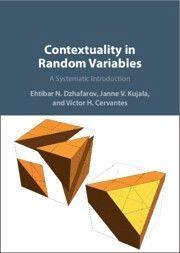The mathematical essence of contextuality lies in the similarity of random variables answering the same question in different contexts: contextuality means they are less similar when considered within their respective contexts than when isolated from them. This book presents a principled way of measuring this similarity and distinguishing two forms of context-dependence: contextuality and disturbance. While applicable across a broad range of disciplines, the concept of contextuality in this book is closest to that in quantum physics, where its special forms - in the absence of disturbance - are known as Bell non-locality and Kochen-Specker contextuality. This systematic introduction requires no prior familiarity with the subject and only minimal mathematical background. Structured as a textbook, complete with exercises and solutions, it is accessible to a broad readership and suitable for teaching. It will be useful to researchers and students in quantum mechanics, philosophy of science, psychology, computer science, linguistics, and probability theory.
Bitte wählen Sie Ihr Anliegen aus.
Rechnungen
Retourenschein anfordern
Bestellstatus
Storno








